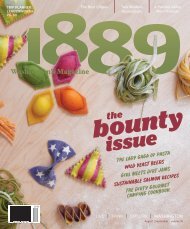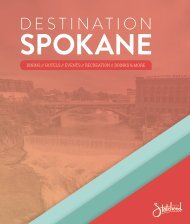You also want an ePaper? Increase the reach of your titles
YUMPU automatically turns print PDFs into web optimized ePapers that Google loves.
Clockwise from left: McMenamins, one of the first in craft<br />
brewing, puts as much taste in its renovated properties as its<br />
beers. Cascade Brewery brewmaster Ron Gansberg squeezes fruit<br />
into a barrel for Raccoon Lodge. Oregon is the second largest hop<br />
producer in the U.S. behind Washington. Pelican Brewery opened<br />
doors to beach-goers of Pacific City in 1996.<br />
written by Bob Woodward<br />
with Laurel Bennett<br />
Regarding the Henrys: The German Brewers<br />
Oregon’s brewing fairy tale begins a long time ago in the loose confederation<br />
of states now known as Germany. Henry Saxer, a German<br />
immigrant, was first to the trade in the Oregon Territory, establishing<br />
Liberty Brewery in Portland in 1852. But it was his successor,<br />
Henry Weinhard, who would become the icon of Oregon beer for<br />
the next hundred years.<br />
The same year that Saxer opened Liberty Brewery, the 22-year-old<br />
Weinhard, had just arrived in America by way of Ellis Island. Had<br />
the French been precisely 34 years more punctual in their gifting of<br />
the Statue of Liberty, the young German<br />
might have envisioned a bottle of Henry<br />
Weinhard’s beer, instead of a torch, atop<br />
Lady Luck’s outstretched arm.<br />
Born in the Kingdom of Württemberg<br />
and apprenticed to the brewing trade<br />
in Stuttgart, Weinhard, in 1852, emigrated<br />
into America’s political foreplay<br />
of the Civil War. New York City was no<br />
civilized environment in which to ply his<br />
brewing skills. Weinhard began brewing<br />
his way westward, refining his craft<br />
along the way—first in Philadelphia, then<br />
Cleveland and finally out to Fort Vancouver,<br />
Washington.<br />
The Pacific Northwest must have appeared<br />
to Weinhard as a missive sent<br />
from an all-knowing all-loving, all-brewing<br />
deity. Farmers were already growing<br />
hops in the verdant valleys of the Oregon<br />
Territory, and a thirsty throng of hearty<br />
dock workers, lumbermen and laborers lived in nearby Portland,<br />
where the only brewer in town was fellow German, Henry Saxer.<br />
Weinhard crossed the Columbia to Portland in 1855 and partnered<br />
with George Bottler to have a go at competing with Saxer.<br />
Historical accounts say that Weinhard was disappointed with the<br />
growth of the operations and retreated to the Columbia Brewery at<br />
Fort Vancouver.<br />
Shortly thereafter, Weinhard returned to Portland with more cash<br />
“What Widmer and<br />
BridgePort and the rest<br />
brought to the scene<br />
was that most blessed of<br />
all benedictions: fresh<br />
ale, brewed right there<br />
right now. Overnight,<br />
Portland became the<br />
beer city in America.”<br />
jonathan nicholas,<br />
former Oregonian columnist<br />
and a bolder strategy—to buy out his former partner and Saxer to<br />
become the local monopoly on beer. Bold plans begat bold results.<br />
Soon Weinhard was exporting beer to Asia and across the States. By<br />
1875, his production had grown to more than 40,000 barrels from<br />
just 2,000 when he re-acquired his brewery.<br />
The Bonnet Brigade: Pre-prohibition<br />
While Weinhard was busy making the Pacific Northwest hospitable<br />
for beer drinkers, women with resolve in their bonnets were plotting<br />
countermeasures. In an 1883 meeting at Portland’s First M.E.<br />
Church, just blocks away from Weinhard’s<br />
brewing empire on Burnside Avenue, pious<br />
prohibitionists-to-be were organizing<br />
what would become the Oregon Woman’s<br />
Christian Temperance Union. They took<br />
heart in the words of the guest speaker,<br />
Frances E. Willard, the president of the<br />
national chapter of the Woman’s Christian<br />
Temperance Union:<br />
Years from now, when your conventions<br />
shall be deemed great<br />
events, and your anniversaries shall<br />
bring together its hundreds of thousands,<br />
you will look back to these<br />
words and thoughts and say, `those<br />
women struck the keynote of success.’<br />
(Twenty Eventful Years of the Oregon’s<br />
Woman’s Christian Temperance Union;<br />
Gotshall Printing Company, 1904)<br />
If brewers, contemporary and past,<br />
could wipe any day from history, it would<br />
undoubtedly be this one. That day, motivated by vocation and now<br />
strengthened by organization, women from all parts of the state<br />
rushed forth from the pews of the Taylor Street church under the banner<br />
of the Oregon Woman’s Christian Temperance Union—a crack<br />
outfit that would soon deliver alcohol’s kill-vehicle: Prohibition.<br />
The Temperance Union’s self-described state song, sent its soldiers<br />
across the state with this tender tune:<br />
1859 oregon's magazine winter <strong>2010</strong> 35

















